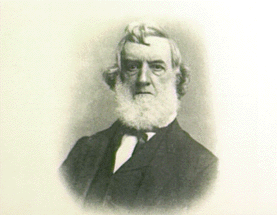![]()

Gideon Welles was born in 1802, to a long-established Connecticut family; one seventeenth-century ancestor was governor and treasurer of that colony. Welles was educated at what is now Norwich University in Vermont, and studied law. But in 1826, he turned to journalism, becoming partner and editor of the Hartford Times, which became one of the first New England newspapers to support Andrew Jackson. In the same year, he was elected to the legislature, and served until 1835 as a Jacksonian Democrat. He figured prominently in battles to expand political rights, such as removing property and religious qualifications for voting. He supported Jackson's anti-bank campaign, and promoted a general incorporation law as an alternative to special charter grants. In recognition of his key role in organizing the Democratic party in Connecticut, Jackson appointed Welles as postmaster of Hartford in 1836. He held that office until the Whig President, William Henry Harrison, removed him in 1841.
A religious and moral man who deplored slavery, Welles soured on the Democratic Party when the slavery issue emerged in the 1850s. He rebelled against the Kansas-Nebraska Act, and in 1856 helped establish the Hartford Evening Press to further the cause of the newly organized Republican Party. Although his campaign to become governor of Connecticut in 1856 failed, Welles served as a Republican national committeeman and member of the party's national executive committee. He also headed Connecticut's delegation to the 1860 Republican national convention in Chicago.
As a reward for his political contributions, and in recognition both of New England and of those former Democrats who, like Welles, had joined the Republican Party, Lincoln appointed Welles as secretary of the navy. He remained in that position during the presidencies of Lincoln and Andrew Johnson, longer than any previous incumbent as Navy secretary. As a former Jacksonian, Welles resisted measures that he associated with excessive federal power, such as the admission of West Virginia as a state. But he supported the Emancipation Proclamation as a war measure, and he ordered navy commanders to give protection to runaway slaves.
When the war ended and Johnson became President, Welles supported the new President against congressional Radicals. Dissatisfied with the Republican Party, he returned to the Democratic Party in 1868. Upon retiring from the Navy Department in 1869, and until his death in 1878, he remained active in politics and as the publisher of articles that have become important resources for understanding the Civil War period.